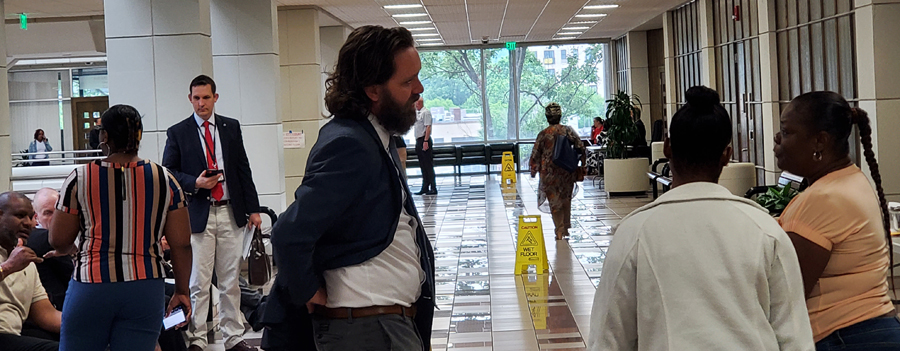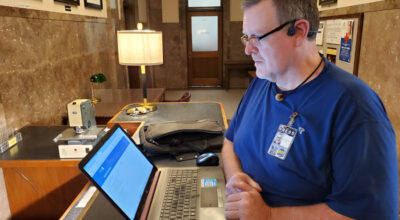
Criminal deense lawyers and clients meet in Hamilton County, Tenn. Civil lawyers in Hamilton County, Tenn., get court summonses for defendants to appear in court — not for a hearing, but for “payment plan” meetings. (Photo David Tulis)
I’ve just come from a meeting with attorney Timothy Millirons, who is representing a high-flying predatory lender suing me for the balance of interest payments in an MCA loan that my radio business could not pay off entirely in the CV-19 economic collapse imposed by Gov.Bill Lee in 2020.
By David Tulis / Copperhead Radio Network
The Hamilton County sessions court had summoned me to a hearing “to answer” in the civil action, and I sat in a largely empty room at a table with Mr. Millirons. He began reciting purported facts and numbers about the controverted predatory loan.
Let’s just set the trial date, I said, refusing to enter into his bavardage.
Policies favor lawyers, not public
Is this gettogether a hearing or a meeting, I ask Mr. Millirons. He’s not sure.
I go straightway to the office of Hamilton County clerk of court Larry Henry with questions about apparent deficiencies that are clear to anyone being sued. The most significant of the following list of grievances is No. 4.
- The local rules are not searchable. The online version is not the OCR, or optical character recognition, version of the document. 12 pages, with rules pertaining to members of the public. Such carelessness suggests the county holds the people in contempt. Here’s the link Local Rules GS 04-14.pdf (hamiltontn.gov)
- Recordings by pro se defendants (most defendants) appear to be forbidden by the rules. Local rule 4(c) says Lawyers says lawyers may make a recording. Tenn. Code Ann. 20-9-104 says “it is lawful for attorneys *** to use tape recorders as an aid to making notes of the proceedings.” The rule says, specifically, attorneys “representing parties in proceedings in any of the courts of this state” may make recording. The agent may use a phone to make a record, and not a person appearing pro se (for himself) or in persona propria (as himself)? The law does not prejudice the pro se party, so the rule must necessarily be construed as allowing electronic recording by a party of his own case.
- The summons gives the wrong room. Rather than 201, the courtroom, it says 101. Room 101 is the clerk’s office at the Hamilton County courts building at 600 Market St. .
- The summons says a defendant is “summon[ed] *** to answer in a civil action brought by [plaintiff name].” But Monday dockets and Friday dockets are not for anyone to answer judicially. People are summoned to “answer to” the lawyer serving the lender or other who filed suit. What is the authority for such compelled meetings, under auspices of the court? Mr. Millirons, of debt-collecting Knight & Hooper law firm, says if a defendant doesn’t show up for the meeting, Mr. Milliron’s client can get a default judgment. He said he didn’t know whether my meeting him at his table was a meeting or a hearing.
How’s that for a confusing state of affairs? Lawyers calling defendants to a “payment plan” meeting under auspices of the court, as if the court was backing the negotiations and hoping the defendant can pay up? Most defendants in collections cases have no attorney. They have little awareness how the system works. They show up under a “summons” and find all they have before them is a “settlement conference.”
The clerk describes the meeting as “an appearance docket.” Seriously?


There is no such thing as FEDERAL, FEDERAL is a general term of convenience, the FEDERAL GOVERNMENT is never listed as a Plaintiff…
soooo, what is the Jurisdiction for a particular cause of action? is it brought under the Articles of Confederation, the Constitution[s], the Emergency Powers/Lieber Code (1863)?